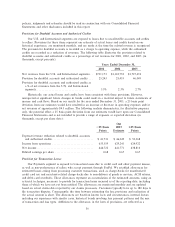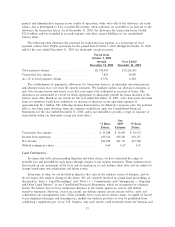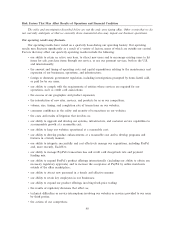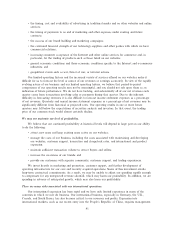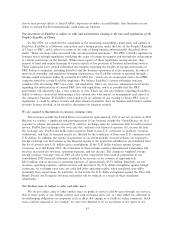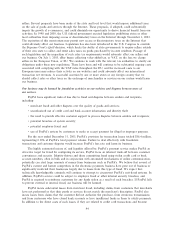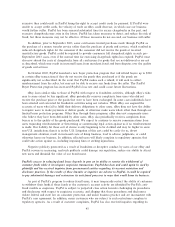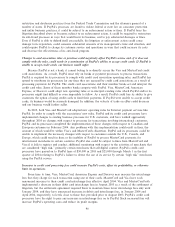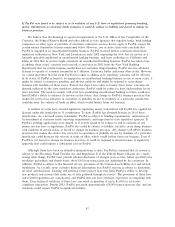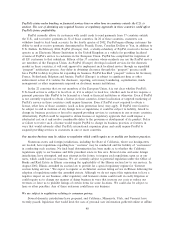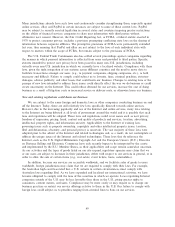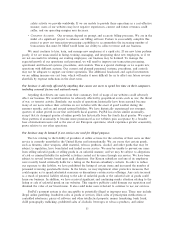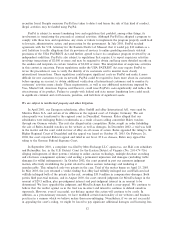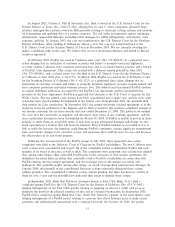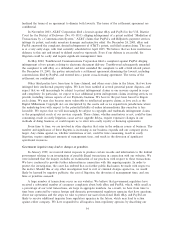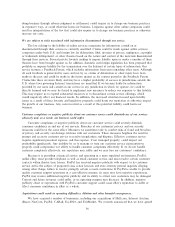eBay 2003 Annual Report Download - page 48
Download and view the complete annual report
Please find page 48 of the 2003 eBay annual report below. You can navigate through the pages in the report by either clicking on the pages listed below, or by using the keyword search tool below to find specific information within the annual report.restriction and disclosure practices from the Federal Trade Commission and the attorneys general of a
number of states. If PayPal's processes are found to violate federal or state law on consumer protection
and unfair business practices, it could be subject to an enforcement action or Ñnes. If PayPal loses the
litigation described above or becomes subject to an enforcement action, it could be required to restructure
its anti-fraud processes in ways that would harm its business, and to pay substantial damages or Ñnes.
Even if PayPal is able to defend itself successfully, the litigation or enforcement action could cause
damage to its reputation, could consume substantial amounts of its management's time and attention, and
could require PayPal to change its customer service and operations in ways that could increase its costs
and decrease the eÅectiveness of its anti-fraud program.
Changes to card association rules or practices could negatively aÅect PayPal's service and, if it does not
comply with the rules, could result in a termination of PayPal's ability to accept credit cards. If PayPal is
unable to accept credit cards, our business would suÅer.
Because PayPal is not a bank, it cannot belong to or directly access the Visa and MasterCard credit
card associations. As a result, PayPal must rely on banks or payment processors to process transactions.
PayPal is required by its processors to comply with credit card association operating rules, and PayPal has
agreed to reimburse its processors for any Ñnes they are assessed by credit card associations as a result of
processing payments for PayPal. The credit card associations and their member banks set and interpret the
credit card rules. Some of those member banks compete with PayPal. Visa, MasterCard, American
Express, or Discover could adopt new operating rules or re-interpret existing rules which PayPal and/or its
processors might Ñnd diÇcult or even impossible to follow. As a result, PayPal could lose its ability to give
customers the option of using credit cards to fund their payments. If PayPal were unable to accept credit
cards, its business would be seriously damaged. In addition, the velocity of trade on eBay could decrease
and our business would further suÅer.
In 2002, both Visa and MasterCard adopted new operating rules for Internet payment services like
PayPal. In order to comply with the associations' new rules, PayPal and its credit card processors have
implemented changes to existing business processes for U.S. customers, and have worked aggressively
throughout 2003 on changes with respect to processes for transactions involving international customers.
PayPal and its processors completed the implementation of these changes with respect to Canadian and
European customers in February 2004. Any problems with this implementation could result in Ñnes, the
amount of which would be within Visa's and MasterCard's discretion. PayPal and its processors could be
unable to implement the necessary changes with respect to customers outside the U.S., Canada, and
Europe, which could result in Ñnes or the inability of PayPal to process MasterCard payments for
international merchants in certain countries. PayPal also could be subject to Ñnes from MasterCard and
Visa if it fails to register and conduct additional monitoring with respect to the activities of merchants that
are considered ""high risk,'' primarily certain merchants that sell digital content. PayPal's credit card
processors have passed on to PayPal Ñnes of $50,000 in 2003 and $25,000 through March 1 in the Ñrst
quarter of 2004 relating to PayPal's failure to detect the use of its service by certain ""high risk'' merchants
using the PayPal service.
Increases in credit card processing fees could increase PayPal's costs, aÅect its proÑtability, or otherwise
limit its operations.
From time to time, Visa, MasterCard, American Express and Discover may increase the interchange
fees that they charge for each transaction using one of their cards. MasterCard and Visa have each
announced increases to their credit card interchange fees eÅective April 2004. Visa and MasterCard both
implemented a decrease in their debit card interchange fees in August 2003 as a result of the settlement of
litigation, but the settlement agreement required them to maintain these lower interchange fees only until
January 2004, and they have announced increases in debit card interchange fees, in January 2004 and
April 2004, respectively, to levels close to those that prevailed prior to August 2003. PayPal's credit card
processors have the right to pass any increases in interchange fees on to PayPal. Such increased fees will
increase PayPal's operating costs and reduce its proÑt margins.
46


